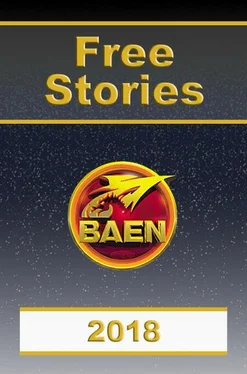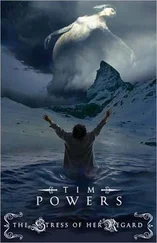“The boat is lighter, Herr Kahloin,” Ellie said. “I’d swear on it.” They were on their way up. The boat had gone deep and this time they’d been able to tell, because the gauges had not blown out over the depth reader. Not at two hundred and fifty meters. Not at two hundred and seventy-five. At two hundred and seventy-five, Lachs had stopped. It would work or it wouldn’t. They could always go down deeper, next time, and try again. “Can you feel it?”
Lachs shook his head. “I will only imagine it now, Joachim.” Goond had thought it was his imagination. Maybe it hadn’t been. Ellie was the one who would know. If Ellie said the boat was lighter relative to its medium—if Ellie said that the boat was no longer in fresh water—
One hundred and forty meters, and rising. They were not dead, and that was the most important thing. For Goond, at least, and for the rest of the crew; for Lachs? Because if not being dead were more important than escaping Lake Superior, for Lachs, how would Goond be able to test his hypothesis?
“Do you get a signal, Bentzien?” Goond called back, quietly, to the radio room. But Bentzien shook his head.
“We are still too deep, EinsVo. Not yet.” Goond waved a hand in apology. He was just anxious. He had a GPS in his pocket. He was still sure there was a risk of trace-back, but Charlie had almost convinced him that there was so much traffic that U-818 would be lost in the noise. It would have to wait until they surfaced, one way or another.
One hundred and ten meters. One hundred meters. Ellie gave the hydroplane operators a correction, low-voiced. The boat was lighter. They needed to be sure the boat did not breach on surfacing, to be mistaken perhaps for a whale by some vacationer in a small boat. That would be unfortunate, though it would continue the whale theme of their problem, their mission to locate U-797 before “Ahab” Dietsch found his Moby Dick, like an ocean-going Don Quixote torpedoing a wind-mill. There were no whales in Lake Superior, any more than there were U-boats.
One hundred. Ninety. “What are you thinking, Herr Kahloin?” Goond asked Lachs. He tried to make it lighthearted, to give no hint of the importance of the question in his mind. He would find out. Very soon now. He would find out.
“Dietsch has always been a good warrior,” Lachs said. “But not a man so suited for peacetime. He lives to fight. He will keep on fighting. Now we may have to fight him, U-boat to U-boat. I hope it doesn’t come to that.”
So Lachs was focused on his aim, and that was a data point. The boat was at seventy-five meters and rising ever more quickly as it neared the surface, and Ellie made some more adjustments to trim. Seventy meters. Sixty. Goond did his best not to hold his breath. All around him, in the relative quiet of the electrical motors, he could sense the crew doing the same in their own ways, pretending nonchalance, trying to maintain their calm in the face of their relief at being on the rise and at not being quite dead yet. Fifty meters. Thirty. Twenty.
They seemed to be rushing to the surface, the closer they got, no matter how careful everybody knew Ellie was. Fifteen meters. Ten meters. Five meters—“Up periscope,” Lachs said, calmly. Goond knew Lachs was not calm. That wasn’t the point. The point that everybody knew Lachs was being calm for them, to hearten and reassure them as best he could.
They had not breached the surface. Ellie was once more in his familiar element—salt water—and he was in complete command of his boat, of the mechanical creature, of the machine to which they owed their lives. U-818 was a good boat. Goond had not been on a better.
Periscope up. Lachs took a first scan, then started talking as he scanned again. “I see no traffic,” Lachs said. “It is a dark night.” As it should be, based on ship’s chronometers—since they had gone east. If they’d gone as they hoped to. “If that is the moon, it is low on the horizon, and half-full. I see no lights. Surface, Ellie.”
So far there was little information, except for Ellie’s sense of the relative weight of the boat. In the Gulf of Saint Lawrence they might see much the same as they had on Lake Superior: no coastline; no particular traffic.
Goond passed his GPS to Lachs as Lachs passed, and Lachs turned it on with a decisive gesture, climbing the ladder up through the conning tower to wait at the bridge hatch for Ellie to give him the signal. It had been designed for use on a boat, Charlie had said. Waterproof.
When Lachs opened the bridge hatch the second watch followed him up, Goond bringing up the rear. Goond did his best to judge the quality of the fresh air being drawn through the boat by its fans: salt? Fresh? Climbing to the top the ladder, his head barely clearing the hatch, Goond waited. Lachs bent down close, his expression unreadable against the clear dark sky. It was warm. They were not on Lake Superior any more.
“We made it,” Lachs said. “We’re off the coast of Barbados. East-southeast for Brazil, according to this instrument. And Argentina. The GPS finds a date-stamp, it has been only three days since we left Salmon Shore. Tell the crew.”
Every U-boat man knew how to do a controlled fall down from the bridge through the conning tower to the Zentral, using the uprights of the ladder to guide and brake them. Goond hopped down now. “We’re out!” he shouted. “Caribbean Sea. 2005. We’re out, we’re free, it’s worked!”
They would find U-797. They would find the White Whale. They would save Dietsch, and all he might encounter, from disaster. Goond knew they could do it. Because now he thought, he thought for almost certain, that whether or not Lachs himself understood what was going on, the ship—and the crew—would follow Lachs’ heart.
Fortunately for them all, Lachs’ heart was true.
Stephen Lawson
Homunculus
The yellow-orange tholin haze above Titan’s surface whirled around the chassis of a lighter-than-air research drone. A tiny carbon-fiber humanoid robot sat perched on its support structure, dangling his feet next to the drone’s camera as it took pictures of the rocky surface below. The dirigible, designed to carry sampling probes and communication equipment, barely registered the stowaway’s mass. Folded aramid-fiber wings fluttered on aluminum ribs on the bot’s back as the breeze swept over the drone’s chassis.
"Man, this place really does have atmosphere," Gavin whispered.
He snorted at his own bad joke.
It keeps out the cosmic radiation though. They have to live underground on Mars, like moles.
Gavin watched the haze roil beneath his tiny carbon-fiber feet. It wasn’t really him of course. Gavin and his wife Lori were hurtling through the space between Earth and Saturn in a Goshawk Heavy Transport. The winged avatars through which they interacted with Titan’s small colony would’ve only come up to his knee if they stood side-by-side. Nonetheless, six hour virtual reality workdays in the bubble box made the homunculus’s carbon-fiber shell feel very much like skin.
Steady development in smartphone battery capacity and size had paved the way for the tiny twelve to fourteen hour lithium-ion battery nested in his back. The same was true of the dual micro-cameras that gave the homunculus crisp depth perception and picture, even in Titan’s shrouded twilight.
Quantum entanglement communication—built on John Bell’s experiments and tested from a satellite to Earth by the Chinese in 2017—had brought the ansible into the real world. It made instantaneous control of the homunculus possible, though the true breakthrough in quantum manipulation hadn’t come until 2021 at CERN. That had earned two post-PhD researchers the title "Spin Doctors" in every major publication when they’d changed the spin of a pair of entangled electrons.
Читать дальше








![Тим Пауэрс - Последние дни. Том 2 [litres]](/books/393813/tim-pauers-poslednie-dni-tom-2-litres-thumb.webp)
![Тим Пауэрс - Последние дни. Том 1 [litres]](/books/394090/tim-pauers-poslednie-dni-tom-1-litres-thumb.webp)
![Тим Пауэрс - Последний выдох [litres]](/books/402145/tim-pauers-poslednij-vydoh-litres-thumb.webp)